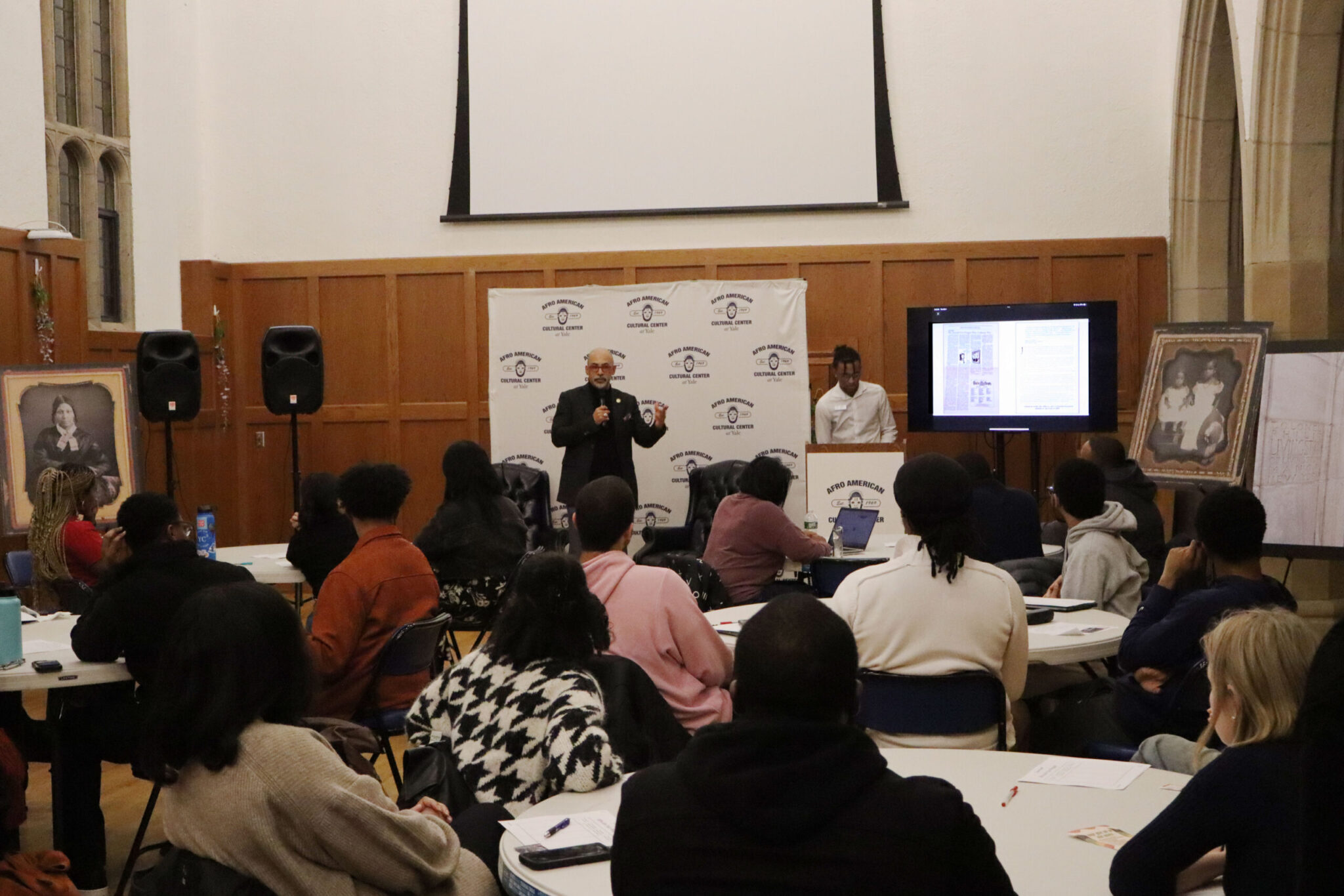Chris Rabb ’92 hosts genealogy workshop
Pennsylvania State Representative Chris Rabb ’92 spoke to members of the Yale and New Haven community to teach them how to trace their own ancestry.

Courtesy of the Af-Am House
Pennsylvania State Representative Chris Rabb ’92 hosted a Black History Month keynote discussion and genealogy workshop last Thursday at The House.
Rabb spoke about his experience as a student at Yale, how he became a genealogist for his family and his direct genealogical ties to the University. He also focused on why believes it is important for community members to trace their own genealogy, or as he referred to it, “reclaiming our stories.”
Hunter Robbins ’27 moderated the event. Robbins said that he was initially nervous to learn about people he had never met and people his father never knew about because of his family’s limited information about their ancestry. He noted that it was basic information he felt everyone should know.
“Sadly, my dad doesn’t know very essential and basic information about our ancestors; Their names, where they’re from, and very basic things, I feel like we all should just really know,” Robbins told the News. “Understanding that I have the ability to learn about my ancestors, even though systems such as slavery made that very difficult and continue to make it very difficult. It’s still possible for me, and being able to help others do that was really meaningful.”
Rabb began the event with a keynote presentation about his Yale experience titled “Yale & Me.”
As a student, Rabb studied African American Studies and was a columnist for the Yale Daily News, where he wrote about race, politics and culture. He resided in Calhoun College, now known as Grace Hopper College, as a student, and explained how the time he spent there correlates to his relationship with history and genealogy.
Rabb called attention to the markers of slavery that existed and still exist on campus, such as a glass-pane window in his residential college while he was a student. Members of the class of 1992 held a protest during the Calhoun College graduation, which Rabb was a part of, where he read a manifesto — called the 1992 Calhoun Manifesto on the College History section of Grace Hopper College’s website — aloud to the audience. He noted that he was shocked by the affirmation he received from the crowd, even earning a standing ovation.
Three years later, Rabb discovered that his ties to Yale were closer to home. He learned that he has direct ancestral ties to Philip Livingston — a member of the class of 1737, a slave trader and the endower of the first professorship at Yale College. Livingston has an archway dedicated to him in the Branford courtyard.
Rabb explained that his grandmother was the woman who inspired him to explore their family history and that she paid him to do so to ensure he would complete the task. Rabb, with the use of archives, connected with family members to find more family members to the point where he even found information on his “father’s, father’s, father” and subsequently found their tie to the Livingston family.
“I just started writing in the names to trace my ancestry, incorporating all the information I could find to create a pedigree chart,” Rabb said. “I looked for birth or death dates, where they lived, where they moved.”
Rabb then transitioned into the workshop portion of the event. He presented a worksheet with four exercises, available to all attendees, meant to provoke thought regarding who attendees defined as their “people” and 10 identities they embraced, as well as a pedigree chart and a descendant chart. In between exercises, Rabb asked participants to speak to their peers about how they felt during the exercises and what meaning they drew from the activities.
Afterward, students were able to access the Ancestry.com database through the Yale Library.
KaLa Keaton ’25, the co-president and co-founder of the Yale Generational African American Students Association, spoke to the News about the impact the series had on her.
“For me, it means everything,” Keaton told the News. “I’m lucky to have a family historian and she’s done a lot of work to find names and track the family tree. But it’s less so on my dad’s side. So, I want to start something for that side of the family as well… and on my mom’s side, for the names that I do know, I want to do the work to learn more about them as humans and inform more of a narrative versus names and dates.”
After the event, Rabb was able to connect with participants and speak more about elements of genealogy that he was not able to cover during the workshop.
Rabb explained to the News why he believes it important to encourage others to learn about their genealogy.
“It’s for those people who are interested in figuring out how they identify, to whom they belong, how they define community, sense of belonging and purpose. It’s hard to do that work without talking about your connection to our very first network, which is our biological family. But families are complex, and that journey is something that is lifelong,” Rabb told the News. “I want to share that gift with as many people who want to undertake that journey.”
The event was co-sponsored by The Afro-American Cultural Center at Yale, Beinecke Library, Pierson College, the Black Student Alliance at Yale and the Yale Generational African American Students







